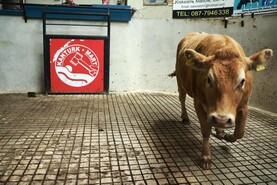The news this week that Asda had introduced a range of two steak cuts imported from Uruguay hasn’t come as a shock to the beef trade.
Until now they, along with all of the other main British supermarkets, stocked exclusively British and Irish beef.
With cattle prices climbing to over £7/kg in the UK this spring, margins along the supply chain were squeezed like never before.
In their comment to the Irish Farmers Journal about this change of policy, the company made two interesting observations.
The first was that the move was temporary – this is common when any business tries a new idea.
It means that they will give it a go for a while and see what customer reaction is the to the offer and then make a decision based on sales evidence of what the longer term policy will be.
The second was that they emphasised that it wasn’t part of Asda’s own-label fresh beef range. Instead it is identified by the supplier's brand, Grass and Grill, which means that while it is on offer in the supermarkets, Asda are keeping a distance from the product.
Customer choice
All UK supermarkets go to considerable lengths to promote their allegiance to British farmers and it is the same in Ireland where all supermarkets promote their Irish credentials. However, the most important person to any supermarket is the one who fills a trolley with goods from their shelves and hands over money in return at the till on the way out. Ultimately, these are the people who decide what a supermarket offers for sale – if it gets bought, it will be restocked; if not, it will be quietly dropped.
Cost
Beef prices in the UK and Ireland increased at an unprecedented rate since the start of this year. Retail prices change over time but are never as volatile as cattle prices, which change on a week-to-week basis. There is always a time lag of several months before farm gate prices get reflected in supermarket shelf prices. That means that it is only recently that cattle price rises are being passed on to consumers. In the meantime, while factories engage in some level of forward pricing, such was the level of price rises this spring that most if not all beef supplies were negotiated on a weekly basis. This meant that supermarkets were carrying a much higher cost for beef that hasn’t yet been fully passed on.
With beef prices at high levels, supermarkets can easily present their loyalty to British and Irish suppliers while introducing an alternative imported range on the basis of giving their customers choice.
Uruguayan beef
Many people in the beef trade were surprised at the choice of Uruguay as Asda’s supply of imported beef. With a tariff-free trade deal and a long historical connection to the UK, Australia might have seemed a more obvious choice. They have been making inroads in the wider imported beef market in the UK, especially in the catering sector, and Australian beef is a recognised quality product. However, when it comes to quality, Uruguayan beef also has a high reputation and comes with a lifetime traceability on par with what is available in the UK or Ireland. It also comes with a major advantage over Irish or even more so British beef – it comes from cattle at a fraction of the cost. Last week steer prices were around $4.80/kg, the equivalent of €4.25/kg, which is a long way behind British and Irish cattle price.
Asda have taken the leap, and no doubt their competitors will be watching closely to see how it works. If there is little or no attention paid or no adverse publicity, then the chances of Tesco or Sansbury’s doing likewise increase. Perhaps the smaller supermarkets that have an exclusively British beef supply might be tempted to do likewise or perhaps even move slightly to using lower-cost Irish beef in their offer.






 This is a subscriber-only article
This is a subscriber-only article










SHARING OPTIONS: